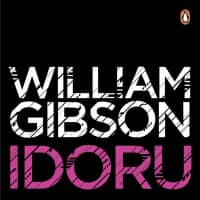The second novel in William Gibson's "Bridge" trilogy, sees its protagonist, Colin Laney, an intuitive recognition sifter of information patterns, in the service of a rock singer hell-bent on marrying a synthetic creation named Rei Toei, the Japanese idol of the title.
Idoru, by William Gibson.
304 pages
VIKING PRESS, Sci-Fi.
It's a complex plot, set in the void of a post-quake Tokyo strewn with fraught relationships, conflicting loyalties, nanotech contraband, confidential data streams, cult fetishes and, just to add a little edge, a sinister Russian criminal enterprise. A satire on technology dependency and longing, Tokyo is portrayed as a factory where artifacts and popular culture figures are rebranded, the city recontextualized against a perpetual dismantling and renewal of real and metastructures.
Gibson is a sci-fi stylist who conjures up prophetic scenes inches away from the parameters of reality. Years before the movie "Inception" (2010) portrayed self-distorting urban structures, skyscrapers in the Tokyo district of Shinjuku were depicted in this 1996 novel with their surfaces coated in an organic substance that makes them "ripple, to crawl slightly ... a movement like osmosis or the sequential contraction of some sea creature's palps."
It's a wonder, given the character of the city, that Gibson can craft a narrative that, in the midst of perceptual scrambling, makes for plausible fiction. Again prescient, in the elapsing two decades since the novel was published, a period in which the synthetic singer Hatsune Miku debuted, the prospect of a human pledging marriage vows with a digital construct has gone from sci-fi to full-blown reality.


















With your current subscription plan you can comment on stories. However, before writing your first comment, please create a display name in the Profile section of your subscriber account page.